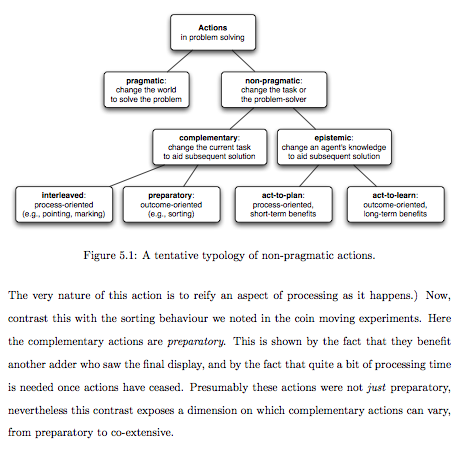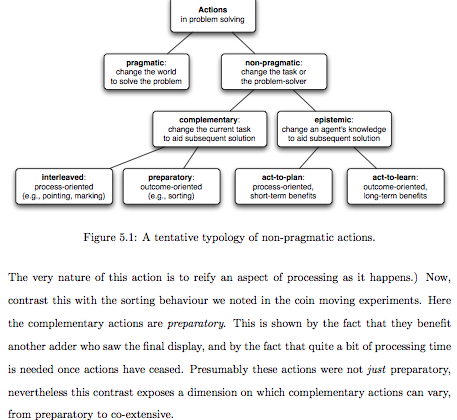

Paper: A taxonomy of (practical vs. theoretical) actions
| The solution to a problem changes the problem. |
| Peer’s Law |
Hansjörg Neth, Thomas Müller
Thinking by doing and doing by thinking: A taxonomy of actions
Abstract: Taking a lead from existing typologies of actions in the philosophical and cognitive science literatures, we present a novel taxonomy of actions. To promote a notion of epistemic agency we distinguish theoretical (mental state-directed) from practical (world-directed) actions. Our basic structural unit is that of a teleological frame, which spans one specific goal of an agent. Relative to a given teleological frame, actions can be classified as focal (directed towards the end) or ancillary (directed towards a means). The framework is applied to further illuminate previous attempts to distinguish between pragmatic and epistemic actions (Kirsh & Maglio, 1994). Physical actions that substitute or support mental processes are re-classified as practical ancillary actions that are strategically contingent alternatives to theoretical actions.
Keywords: Action theory, basic actions, practical vs. theoretical actions, epistemic agency, embodied cognition, complementary strategies, immediate interactive behavior (IIB).
Reference: Neth, H., & Müller, T. (2008). Thinking by doing and doing by thinking: A taxonomy of actions. In V. Sloutsky, B. Love, & K. McRae (Eds.), Proceedings of the 30th Annual Meeting of the Cognitive Science Society (pp. 993–998). Austin, TX: Cognitive Science Society.
Related: Addition as interactive problem solving | Thinking by doing? | Immediate interactive behavior (IIB) | Arabic vs. Roman arithmetic | The cognitive basis of arithmetic | Interactive coin addition
Resources: Download_PDF | Google Scholar
Comments are Disabled